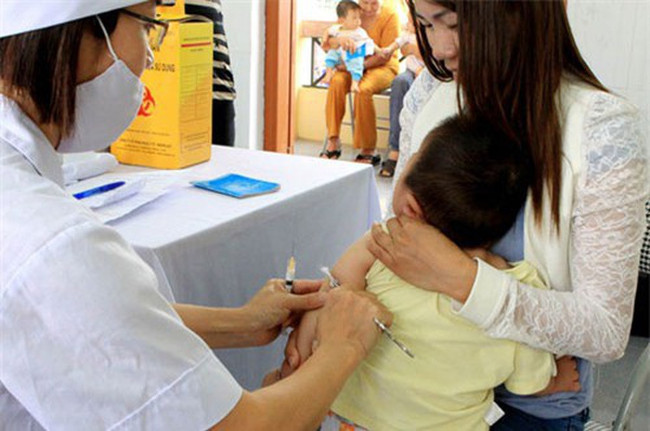Important vaccines need to be given to children over one year of age
Children over one year of age should be re-vaccinated or some more vaccines, especially nasal measles-rubella, Japanese encephalitis.
In the Expanded Immunization Program, children under one year of age need to fully immunize 8 dangerous infectious diseases: tuberculosis, hepatitis B, diphtheria, pertussis, tetanus, pneumonia / pneumococcal meningitis , polio, measles.Children of 18 months of age must repeat the diphtheria vaccine - pertussis - tetanus tetanus (DPT4) and measles-rubella vaccine for free. However, the rate of children injecting these vaccines is not as high as the vaccination for children under one year of age.

After one year, children get free vaccinations for diphtheria-whooping cough-tetanus;measles-rubella and Japanese encephalitis.(Photo: HB).
Before a young age, children are weak, weak immune, and susceptible to dangerous infectious diseases. Therefore, the vaccination for children is strictly followed by parents. However, when children are older, some parents think their children are healthy or forget (the time of repeated injection is quite far away) but neglect to take them to the vaccination schedule. In fact, these injections are equally important to continue to protect a child from disease.
Explaining this, Dr. Duong Thi Hong, Deputy Director of the Central Hygiene and Epidemiology, said that with some vaccines after giving the full dose, antibodies have a protective effect for a certain period of time. Over time, this antibody level decreases, so older children and adults are still at risk of infection. Repeated injections are essential to help the body maintain antibodies that protect the body from long-term attack. Therefore parents should be aware that repeated vaccinations for children help protect children best.
For example, with the measles vaccine, about 15% of children do not have preventive immunization after the first vaccination before age one. Therefore, 18-month-old children who get measles vaccination will add opportunities to create immunity.
Another important vaccine parents need to keep in mind is that three doses of Japanese encephalitis vaccine are given to children aged 1-5 years. The Japanese encephalitis season begins in May, peaking in June and July. This is a very dangerous infectious disease, high mortality and sequelae. It is estimated that about 30% of hospitalized patients die, about 30-50% of cases of children surviving, suffering from severe mental and mental sequelae, affecting health and learning. The risk of death usually occurs in the first 7 days when patients have deep coma, seizures and symptoms of brain damage.
The best preventive measure is vaccination , however, the child must be given enough doses. If only one vaccination is given, there is no protective effect, enough two-dose injection to protect over 80%. Injected with three doses of vaccine against Japanese B encephalitis, the protection effect reached 90-95%. Currently Japanese encephalitis vaccine is given free vaccination to children at commune and ward health stations nationwide. Parents note, Japanese third encephalitis vaccination at two years of age.
In addition, parents should take the initiative in giving children vaccinations for pneumococcal vaccination, chicken pox . at service vaccination sites.
Vaccination schedule for children in the expanded Immunization program
(Free injection at commune and ward health stations)

- 3 common misunderstandings about vaccines
- How are Pentaxim and Quinvaxem vaccines different?
- Things to know about 5 in 1 vaccines and 6 in 1 vaccines
- Treat 'vinegar' in children
- Vietnam stopped using 5 in 1 Quinvaxem vaccine
- Detecting contaminated metals and debris in a series of human vaccines
- Successful development of super vaccines can protect against all types of diseases
- The experiment on an 8-year-old boy was the source of the invention of the vaccine
- Prepare vaccines from green plants, why not?
- The US stopped testing HIV vaccines
- Vietnam vaccines are qualified for world export
- Decode 7 misconceptions people often think about vaccines
 Green tea cleans teeth better than mouthwash?
Green tea cleans teeth better than mouthwash? Death kiss: This is why you should not let anyone kiss your baby's lips
Death kiss: This is why you should not let anyone kiss your baby's lips What is salmonellosis?
What is salmonellosis? Caution should be exercised when using aloe vera through eating and drinking
Caution should be exercised when using aloe vera through eating and drinking